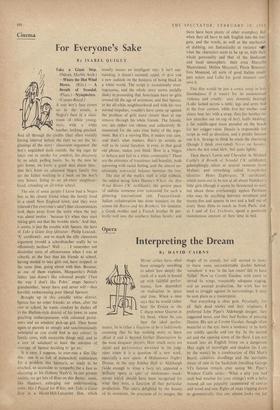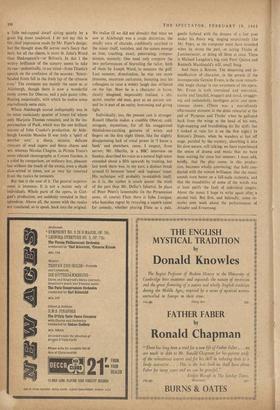Opera
Interpreting the Dream
Ity DAVID CAIRNS -,1( critics have often been strangely unwilling to admit how deeply the truth of a work is bound up with faithful perfor- mance, how dependent on realisation in space and time. When a man says that he would rather hear the Eroica or the C sharp minor Quartet in his head, where he can hear the ideal perfor- mance, he is either a b/mptern. or he is ludicrously assuming that he has nothing more to learn abOut it and is beyond further illumination by the' most eloquent players. How much more are music and performance entwined in the judg- ment when it is a question of a new work, especially a new opera. A Midsummer Night's Dream, in the tiny Jubilee Hall at Aldeburgh (wide enough to wrap a fairy in), appeared a brilliant opera in spite of weaknesses—weak- nesses which should have been recognised for what they were, a function of that particular production. The opera delighted by the beauty of its invention, the precision of its images, the magic of its sounds, but still seemed to many to leave some uncomfortable doubts behind; ' 'somehow' it was 'in the last resort' felt to have `failed.' Now \at Covent Garden, with room to spread its wings, reasonably adeqUate staging. and an assured production, the work has no need to struggle against its surroundings. It may he seen plain as a masterpiece.
Not everything is clear gain. Personally, for all their dead teazles and their wispiness. I preferred John Piper's Aldeburgh designs; they suggested more, and they had flashes of pitircing illusion. His sets at Covent Garden, though often beautiful to the eye, have a tendency to be both too solidly specific and too fey. In the second act and the opening scene of the third. I am not wooed into an English forest on a dangerous May night of moonlight and shadow (as I am by the music) by a combination of Old Man's Beard, cabalistic doodlings and the inevitable threat of rain in the backcloth (recalling George VI's famous remark after seeing Mr. Piper's Windsor Castle series: 'What a pity you had such bad weather for your sittings') with a hefty mound all too palpably carpentered of canvas and wood and neat flights of steps tripping down so geometrically that one almost looks out for a little red-capped dwarf sitting quietly by a great big stone toadstool. I do not say this is the chief impression made by Mr. Piper's design; but the thought does flit across one's fancy that here, for all the charm, is more St. John's Wood than Shakespeare's—or Britten's. In Act I the wintry brilliance of the scenery seems to take its cue—pedantically, to my mind—from Titania's speech on the confusion of the seasons: 'hoary- headed frosts fall in the fresh lap of the crimson rose.' The costumes are mainly the same as at Aldeburgh, though there is now a wonderful reedy crown for Oberon, and a pale gauzy robe, floating majestically, with which he makes some marvellously eerie exits.
Where Aldeburgh scored indisputably was in its mine musicianly quartet of lovers (of whom only Marjorie Thomas remains), and in the im- personation of Puck, which was the one brilliant success of John Cranko's production. At Alde- burgh Leonide Massine II was truly a 'spirit of another sort,' a sharp, incisive, delicate creature of mad capers and fierce charm and wit. whereas Nicolas Chagrin, in Pirmin Trecu's more relaxed choreography at Covent Garden, is a yokel by comparison, an ordinary boy, pleasant but without the touch of the exotic, even a shade slow-witted at times, not so very far removed from the rustics he torments.
But that is the sum of it. The general improve- ment is immense. It is not a matter only of individuals. Whole parts of the opera, in Giel- gud's production, are suddenly revealed in their splendour. Above all, the scenes with the rustics are translated, so to speak, back into the original. We realise (if we did not already) that what we saw at Aldeburgh was a crude distortion; the deadly aura of charade, confidently ascribed to the music itself, vanishes, and the scenes emerge as true, touching, exact, penetrating, compas- sionate, masterly. One need only compare the two performances of Starveling the tailor, both of them by Joseph Ward, to measure the gulf. Last summer, directionless, he was one more tiresome, uncertain caricature, bumping into his colleagues to raise a wintry laugh that withered on the lips. Now he is a character in focus, clearly imagined, impeccably realised, a shy. secret, touchy old man, grey as an ancient ash and he is part of an entity, borrowing and giving light.
Individually, too, the present cast is stronger. Russell Oberlin makes a credible Oberon, cold, arrogant, mysterious, for all his exaggerated thistledown-catching gestures of wrists and fingers on the first night (these, like the slightly disappointing lack of vocal power in 'I know a bank' and elsewhere, came, I suspect, from nerves; Mr. Oberlin, in a BBC interview on Sunday, described his voice as a natural high tenor extended about a fifth upwards by training, but last week there was, to my ears, a distinct break around G between 'tenor' and 'soprano' tones. His technique will probably re-establish itself; as it is. the timbre is much nearer the truth of the part than Mr. Deller's falsetto). In place of Peter Pears's lamentable (in the Pyramusian sense, of course) Flute there is John Lanigan, who banishes regret by revealing a superb talent for comedy, whether playing Flute as a pale,
gentle fathead with the dreams of a lost poet under his fleecy wig, singing suspiciously like Mr. Pears, as the composer must have intended when he wrote the part, or acting Thisbe di Lammermoor, or doing all three at once. There is Michael Langdon's big, rosy Peter Quince and Kenneth Macdonald's still, small Snug.
And there is Bottom. The deepening and in- tensification of character, in the person of the incomparable Geraint Evans. is the most remark- able single change in our awareness of the opera. Mr. Evans is both restrained and mercurial, earthy and fanciful, braggart and timid. swagger- ing and melancholy, intelligent artist and spon- taneous clown. (There was a marvellously effervescent moment in the dress rehearsal at the end of 'Pyramus and Thisbe' when he galloped back from the wings at the head of his men, high-stepping and brandishing his fist aloft; but I looked in vain for it on the first night.) In Bottom's Dream, when he wanders at last off stage. puzzled by the mystery, absorbing it into his slow nature. still talking, we have experienced the union of drama and music that we have been waiting for since last summer. I must add, briefly, that the play scene, in this produc- tion. becomes wholly convincing; that Solti con- ducted with the utmost brilliance; that the music sounds even better on a full-scale orchestra, and that the inaudibility of some of the words was at least partly the fault of individual singers. About the music I hope to write again after a second visit. But first, and belatedly, some re- marks next week about the performances of AriaiThe and Erwartung.











































 Previous page
Previous page